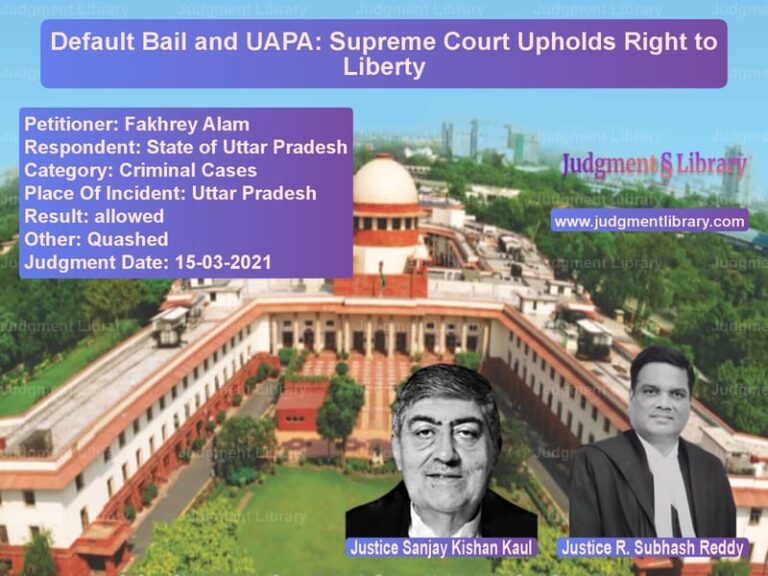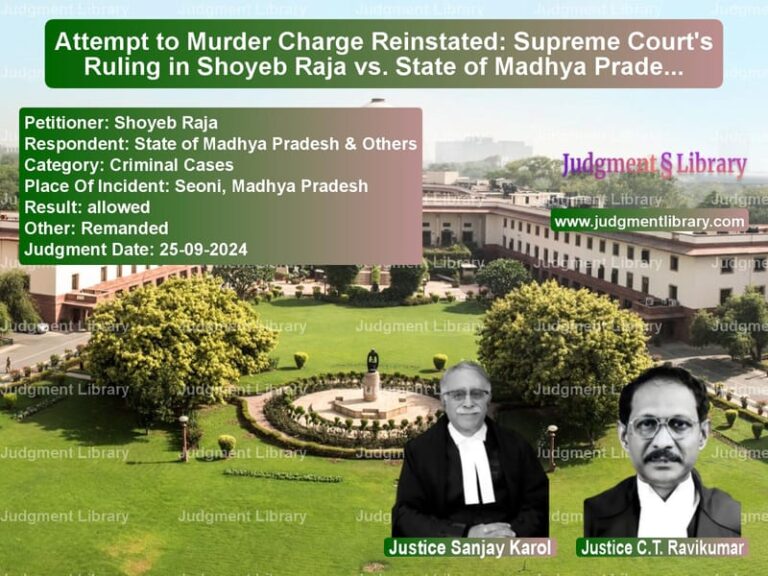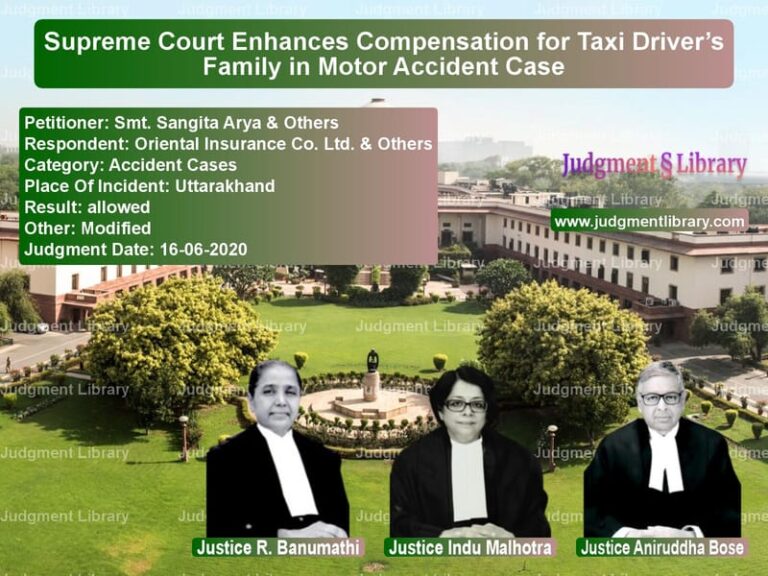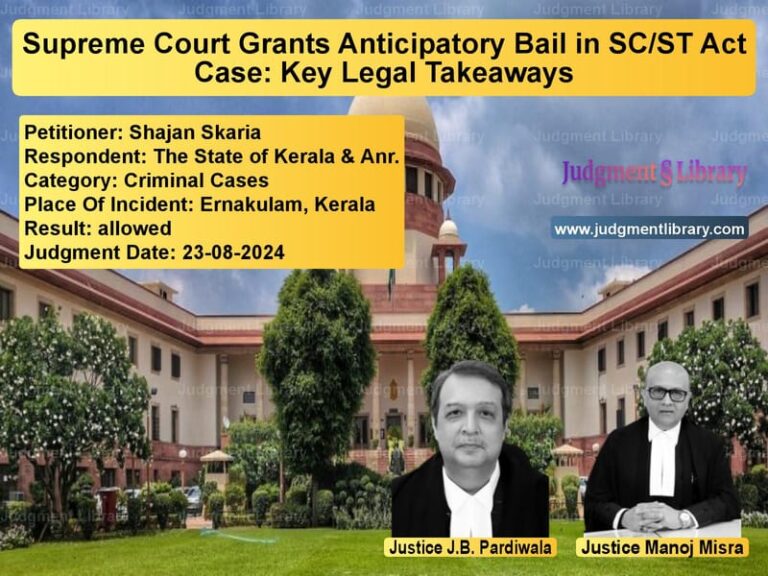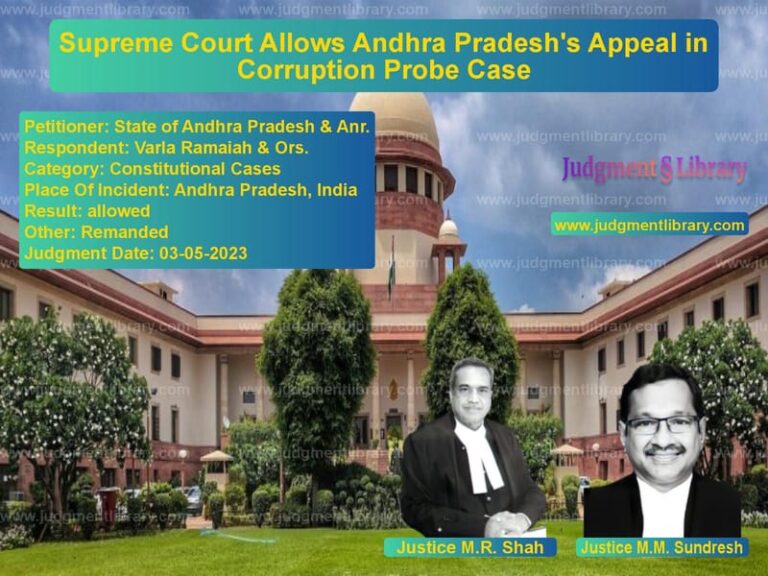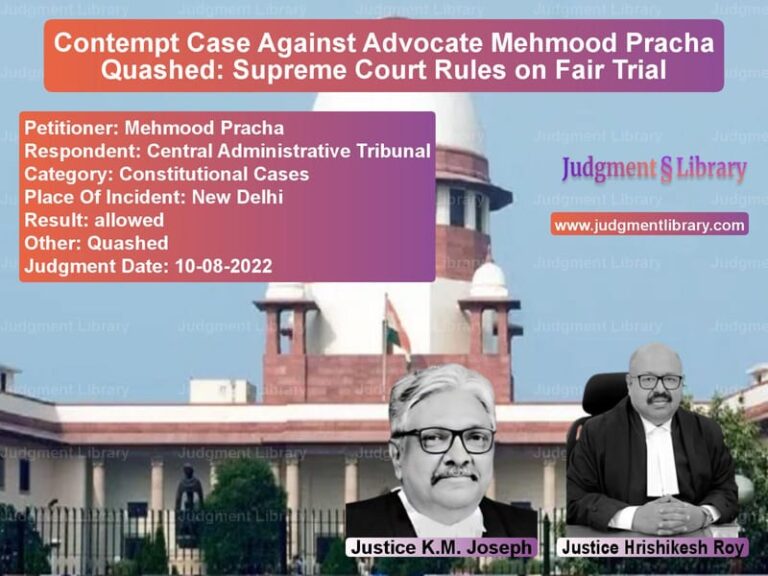Supreme Court Denies Sentence Reduction in Brutal Assault Case
The present case involves an appeal filed by Bhagwan Narayan Gaikwad challenging his conviction and sentence for an attack that left the victim, Subhash Yadavrao Patil, permanently disabled. The Supreme Court was called upon to decide whether the appellant’s conviction under Section 326 of the Indian Penal Code (IPC) should be reconsidered and whether the sentence should be reduced due to a compromise between the victim and the accused.
The judgment highlights the legal principles surrounding grievous hurt, sentencing considerations, and the impact of post-conviction compromise agreements in serious criminal cases. The Supreme Court ultimately rejected the plea for a reduced sentence, emphasizing that the nature of the crime warranted stringent punishment.
Background of the Case
The incident occurred on December 13, 1993, when Subhash Yadavrao Patil was attacked while returning to Malegaon on his bicycle. The accused, along with his accomplices, arrived on a tractor and began pelting stones at the victim. After knocking him down, the appellant, Bhagwan Narayan Gaikwad, struck the victim with a sword, severing his right leg below the knee and his right forearm below the elbow.
Read also: https://judgmentlibrary.com/supreme-court-cancels-bail-in-criminal-case-key-legal-analysis/
The victim was rushed to the hospital, where medical examination confirmed that his injuries were life-threatening. Despite immediate medical intervention, he was left permanently disabled, with both his right arm and leg amputated.
Legal Issues Considered
- Whether the conviction under Section 326 IPC was justified.
- Whether the post-conviction compromise between the victim and the accused warranted sentence reduction.
- The principles governing sentencing in cases of grievous bodily harm.
Arguments by the Appellant
- The appellant’s counsel argued that the incident occurred in 1993 and that the appellant had been on bail during the trial and appeal.
- The appellant had already served five months of his sentence before filing the appeal.
- A compromise affidavit was filed by the victim, stating that the matter had been settled amicably and that the appellant should be released in the interest of peace and harmony.
- The appellant was 65 years old and suffered from a heart condition, making continued incarceration an undue hardship.
Arguments by the Respondent
- The State of Maharashtra opposed the reduction of the sentence, arguing that the attack was brutal and life-altering for the victim.
- The prosecution emphasized that the crime had permanently crippled the victim, who had lost vital organs of his body and had to rely on prosthetic limbs.
- The sentencing process must reflect the gravity of the crime and should not be influenced by post-conviction compromise.
- The compromise affidavit had been obtained only after the High Court confirmed the conviction, raising concerns about its voluntariness.
Supreme Court’s Observations
The Supreme Court, comprising Justices Ajay Rastogi and Abhay S. Oka, carefully examined the facts and applicable legal principles before delivering its ruling.
- The Court noted that the appellant had been rightly convicted under Section 326 IPC, as the attack was deliberate and brutal.
- The victim’s medical records confirmed that he had suffered a permanent disability and had been crippled for life.
- The Court acknowledged the compromise affidavit but stated that it could not be the sole basis for reducing the sentence.
- The Court cited legal precedents indicating that post-conviction compromise agreements in serious offenses should not undermine the principle of just punishment.
- The sentence of five years’ rigorous imprisonment and a compensation payment of Rs. 2 lakhs to the victim was deemed appropriate.
Final Judgment
The Supreme Court dismissed the appeal and upheld the appellant’s conviction and sentence. The key directives included:
- The conviction under Section 326 IPC remained unchanged.
- The appellant must serve the full five-year sentence.
- The compensation payment of Rs. 2 lakhs to the victim was upheld.
- The Court rejected the plea for leniency based on the compromise agreement.
Conclusion
This judgment underscores the Supreme Court’s commitment to ensuring that violent crimes resulting in permanent disability receive appropriate punishment. The Court reinforced that while compromise agreements may be considered in some cases, they cannot override the need for justice in cases involving grievous bodily harm.
The ruling serves as a precedent for future cases involving serious physical injury, emphasizing that the criminal justice system must uphold fairness and deterrence rather than allowing post-conviction settlements to influence sentencing decisions.
Petitioner Name: Bhagwan Narayan Gaikwad.Respondent Name: State of Maharashtra & Others.Judgment By: Justice Ajay Rastogi, Justice Abhay S. Oka.Place Of Incident: Malegaon, Maharashtra.Judgment Date: 20-09-2021.
Don’t miss out on the full details! Download the complete judgment in PDF format below and gain valuable insights instantly!
Download Judgment: bhagwan-narayan-gaik-vs-state-of-maharashtra-supreme-court-of-india-judgment-dated-20-09-2021.pdf
Directly Download Judgment: Directly download this Judgment
See all petitions in Bail and Anticipatory Bail
See all petitions in Attempt to Murder Cases
See all petitions in Judgment by Ajay Rastogi
See all petitions in Judgment by Abhay S. Oka
See all petitions in dismissed
See all petitions in supreme court of India judgments September 2021
See all petitions in 2021 judgments
See all posts in Criminal Cases Category
See all allowed petitions in Criminal Cases Category
See all Dismissed petitions in Criminal Cases Category
See all partially allowed petitions in Criminal Cases Category


